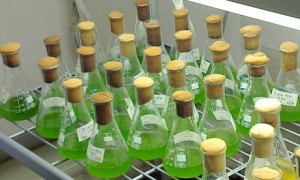Just in time for the 25th anniversary of Back to the Future, the flux capacitor is back in action. Only this time, it’s not taking us back in time – it’s bringing us fuel. Last week, a bubble-maker that mimics the flux capacitor in looks alone, was awarded the Royal Society’s Brian Mercer award for innovation, a £250,000 prize. The money will help bring the technology to market. The technology received the award due to its ability to transform the cost and effectiveness of growing algae for biofuel, treating sewage and cooling computers.
 The machine was invented by Prof Will Zimmerman, a chemical engineer at the University of Sheffield. His muses were children and how they blow bubbles. “If you blow slowly and steadily, you blow a big bubble, but we use our fluidic oscillator to blow short puffs and make small bubbles,” explained Zimmerman to the Guardian.
The machine was invented by Prof Will Zimmerman, a chemical engineer at the University of Sheffield. His muses were children and how they blow bubbles. “If you blow slowly and steadily, you blow a big bubble, but we use our fluidic oscillator to blow short puffs and make small bubbles,” explained Zimmerman to the Guardian.
According to the paper, the device has already been involved in several field trials with the goal of diverting the carbon dioxide produced during the manufacturing process of steel plant and routing the CO2 bubbles to algae, which need it to survive and grow. A bonus from the system is that that small bubbles carry away waste oxygen and allow 100 percent of the algae to survive.
“If you sit in your own waste products, it’s not good for your health, it stunts your growth and leads to death,” said Zimmerman. “The bubble-maker also stirs the algae, meaning each cell is better exposed to the light it needs to grow. I call it a five star hotel for algae.”
It appears that both ExxonMobil and Shell have both separately invested in the technology.
“There has been a lot of hype in this area and we think algal biofuels are 10 years from being commercialized, as most of the expertise is in the laboratory at the moment,” said Ben Graziano, Carbon Trust manager of the Algae Biofuels Challenge. “But biofuel from algae can reduce carbon dioxide emissions significantly better than many existing biofuels, and can be sustainable as they don’t need arable land.”

